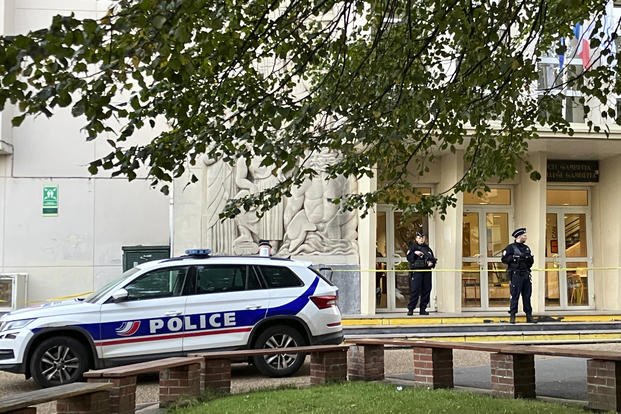
France will mobilize up to 7,000 soldiers to increase security around the country after a teacher was fatally stabbed and three other people wounded in a school attack by a former student suspected of Islamic radicalization, the president’s office said Saturday.
Some schoolchildren, parents and personnel returned to the Gambetta-Carnot school in the northern city of Arras as it reopened Saturday morning to reconnect and seek support, after the attack Friday that rattled France in a context of global tensions over the Israel-Hamas war.
Counterterrorism authorities are investigating the stabbing, and the suspected assailant and several others are in custody, prosecutors said. The suspect had been under recent surveillance by intelligence services for radicalization. Court documents viewed by The Associated Press show he is from the Ingushetia region in Russia’s Caucasus Mountains, which neighbors Chechnya. Authorities had initially identified him as Chechen.
The French government heightened the national threat alert, and President Emmanuel Macron ordered up to 7,000 soldiers deployed by Monday night and until further notice to bolster security and vigilance around France, his office said. The “attack emergency” threat posture allows the government to temporarily mobilize the military to protect public places among other measures.
The attacker’s exact motive remains unclear, and he is reportedly refusing to speak to investigators.
Another mother came to seek guidance from counselors about how to support her two sons, who witnessed the attack in their schoolyard.
“As adults, we are managing with difficulty to take a step back, but for them, they’re children,’’ said Emily Noge, arriving at the school with her sons and partner. ‘’They initially thought it was an exercise, so keeping things separate, to say that we’ve passed from an exercise to something dramatic, is very tricky for them.”
‘’It’s always the same moments that come back: The schoolyard, the chairs to protect themselves, the stabbings, the whys. ‘Why us? Why Arras? Why the teachers? They were good teachers. They were there to protect us,’” she said.
For many in France, the attack echoed the killing of another teacher, Samuel Paty, almost exactly three years ago near his Paris area school. He was beheaded by a radicalized Chechen later killed by police.
The suspect in this week’s attack had been under surveillance since the summer on suspicion of Islamic radicalization, French intelligence services told AP. He was detained Thursday for questioning based on the monitoring of his phone calls in recent days, but investigators found no sign that he was preparing an attack, Interior Minister Gerald Darmanin said.
French intelligence suggested a link between the war in the Middle East and the suspect’s decision to attack, the minister said. He said authorities have detained 12 people near schools or places of worship since the Hamas attack on Israel, some of whom were armed and were preparing to act. France has heightened security at hundreds of Jewish sites around the country this week.
The prosecutor said the alleged assailant was a former student there and repeatedly shouted “Allahu akbar,” or “God is great,” during the attack. Prosecutors are considering charges of terrorism-related murder and attempted murder against the suspect.
The dead educator was Dominique Bernard, a French language teacher at the Gambetta-Carnot school, which enrols students ages 11-18. Another teacher and a security guard were in critical condition with wounds from the stabbing, police said. The counterterrorism prosecutor said a cleaning worker was also injured.
Announcing that the school would reopen Saturday, Macron urged the people of France to “stay united.”
“The choice has been made not to give in to terror,” he said. “We must not let anything divide us, and we must remember that schools and the transmission of knowledge are at the heart of this fight against ignorance.”
___
Charlton reported from Paris. Associated Press journalists Nicolas Garriga in Arras, France, Nicolas Vaux-Montagny in Lyon, France, John Leicester in Paris and Elise Morton in London contributed to this report.




